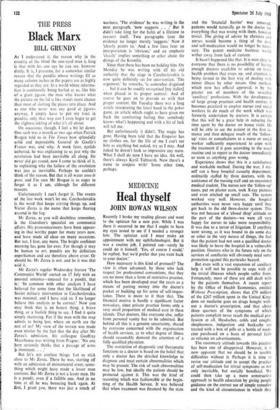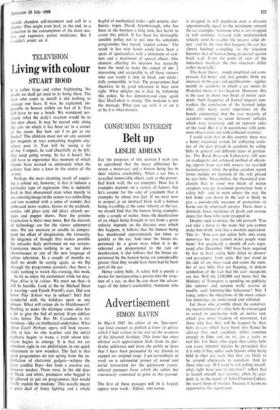Heal thyself
MEDICINE JOHN ROWAN WILSON
Recently I broke my reading glasses and went to the optician for a new pair. While I was there it occurred to me that I ought to have my eyes tested to see if I needed a stronger lens. The optician said I must make an appointment with my ophthalmologist. But it was a routine job, I pointed out—surely he could do it himself. 'Yes, of course I could,' he replied, 'but we'd prefer that you went back to your doctor.'
How necessary is this kind of protocol? The view is often advanced, by those who lack respect for professional conventions, that they are no more than a form of restrictive practice, which has been developed over the years as a means of putting money into the doctor's pocket or building up his sense of self-impor- tance. There is more to it than that. The financial motive is hardly a significant factor nowadays, since private practice forms only a very small proportion of medical care in these islands. That doctors, like everyone else, suffer from personal vanity has to be admitted. But behind all this is a genuine uncertainty, shared by everyone concerned with the organisation of health services, as to what degree of illness should reasonably demand the attention of a fully qualified physician.
The restriction of diagnostic and therapeutic functions to a doctor is based on the belief that only a doctor has the detailed knowledge to diagnose and treat certain abnormalities which may be present. The risk of such abnormalities may be low, but ideally the patient should be protected against it. This was the kind of reasoning which was fashionable at the begin- ning of the Health Service. It was believed that when treatment was financed by the state and the 'financial barrier' was removed, patients would naturally go to the doctor for everything that was wrong with them, however trivial. The giving of advice by chemists and nurses would become a thing of the past, and self-medication would no longer be neces- sary. The patent medicine business would wither away from lack of custom.
It hasn't happened like that. It is now clear to everyone that there is no possibility of havin2 enough doctors available to advise on every health problem that crops up, and attention is being turned to the best way of dealing with minor illness by other means. One method, which now has official approval, is by the greater use of members of the so-called 'auxiliary' professions. With the development of large group practices and health centres, it becomes practical to employ nurses and social workers to do much of the work which was formerly undertaken by doctors. It is certain that this will be a great help in reducing the time spent by the doctor on house visits. He will be able to see the patient in the first in- stance and then delegate much of the 'follow- up' visits or consultations to a nurse or social worker sufficiently experienced to cope with the treatment if it goes according to the usual routine and to report to the doctor immediately as soon as anything goes wrong.
Experience shows that this is a satisfactory and workable method. During the war, I my- self ran a busy hospital casualty department, ordinarily staffed by three doctors, with the assistance of the nursing staff and an occasional medical student. The nurses saw the 'follow-up' cases, put on plaster casts, took X-ray pictures and even stitched up small cuts. The system worked very well. However, the hospital authorities were never very happy until they got back to the old three-doctor system. This was not because of a 'closed shop' attitude on the part of the doctors—we were all very happy for nurses to take more responsibility.
It was due to a terror of litigation. If anything went wrong, as it was bound to do some day or other in the very nature of things, the fact that the patient had not seen a qualified doctor was likely to leave the hospital in a vulnerable position. Doctors who in the future rely on the services of auxiliaries will obviously need some protection against this particular hazard.
But even with a vast expansion of auxiliary help it will not be possible to cope with all the trivial illnesses which people suffer front Fortunately, most of these are still dealt with by the patients themselves. A recent report by the Office of Health Economics, entitled Without Presckiption, shows that £79 million of the £267 million spent in the United King- dom on medicine goes on drugs bought with- out a doctor's prescription, and that about three quarters of the symptoms of which patients complain never reach the medical pro- fession at all. Headaches, colds and coughs, sleeplessness, indigestion and backache are treated with a box of pills or a bottle of medi- cine purchased on a basis of personal faith or reliance on advertisements.
The customary attitude towards this practice has been one of disapproval. However, it is now apparent that we should be in terrible difficulties without it. Perhaps it is time to revise our attitude and to accept the practice of self-medication for trivial symptoms as not only inevitable, but socially beneficial. We could then take up a more constructive approach to health education by giving people guidance on the correct use of simple remedies and the kind of circumstances in which they should abandon self-treatment and call in a doctor. This might even lead, in the end, to a reduction in the consumption of the more use- less and expensive patent medicines. But I wouldn't count on it.







































 Previous page
Previous page